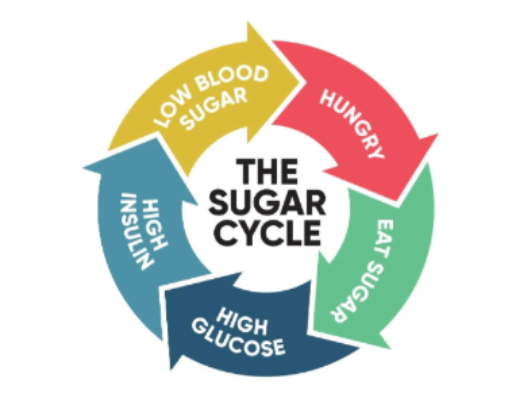Why is it that many of us crave sweet foods? When we’re happy, we want to celebrate with a sweet treat. When we’re sad, we console ourselveswith ice cream or chocolate. After a special dinner, we often have a special dessert.
Industrialized refined sugars are well integrated into our psyche in so many ways, starting when we’re very small with our parents using them as part of a reward system.
Our brains get trained to crave sweets for so many habitual reasons that, for some, satisfying the cravings becomes an addictive behavior.
Our brain likes sugar because it releases the feel-good hormone dopamine, and since we’re hardwired to enjoy pleasure, sugar gets us there fast and leaves us hungry again when the sugar high dissipates.
Sugar acts like a drug because it stimulates the same part of the brain that harmful drugs like nicotine and cocaine stimulate.
Food manufacturers figured out long ago that if they added sugar to processed foods, their products would “taste better” and be more popular. Something like ketchup doesn’t need added sugars when tomatoes are naturally sweet,but sugar is routinely added to it.
Like any addictive substance, the more a person ingests, the more they need that release of dopamine to get another feel-good hit.
Is ingesting refined industrialized sugars really that big of a deal?
Well, start with the fact that it can lead to many diseases, including diabetes, fatty liver disease, obesity, inflammation – and now even cancer is being linked to refined sugar intake. These reasons alone should convince you to quit — right? Yes, for some, especially if they’ve had a health scare, this can be enough to quit refined sugars. Others tend to lead their life thinking, “it won’t happen to me.”
Nutritionally speaking, industrialized refined sugar is stripped of all of its natural micronutrients and fiber. This is why it causes a fast spike in our blood sugar, which then quickly plummets again, causing more cravings and reaching for more quick fixes.
Excessive sugar consumption also can cause a considerable increase of triglyceride levels in the blood that can lead to cardiovascular disease, high blood pressure, heart attacks, immune system weakness, hyperactivity, fatigue, anxiety, lack of concentration and headaches.
Sugar also increases bacterial and yeast fermentation in the intestines that can increase insulin secretion and overload the pancreas, causing harmful chronic inflammation.
The first cause of pancreatitis is often assumed to be excessive alcohol consumption, but in acute attacks of pancreatitis, a high level of amylase — a digestive enzyme produced by the pancreas, is found in the blood. The blood levels of calcium, magnesium, sodium, potassium and bicarbonate are also altered.
With these altered blood values, pancreatitis can be diagnosed—and, in many cases, it’s not caused by alcohol, but by sugar consumption. Once sugar consumption is reigned in, inflammation can heal, and blood values can return to normal.
And then there is the obvious issue of weight gain when refined sugars are overconsumed. It doesn’t help that when food manufacturers started pushing “fat free” decades ago, they loaded up products with refined sugars instead—in forms that made it hard to discern this when reading labels.
Consumers have been deceived for far too long, and many of us are paying the price with one third of the U.S. population suffering from obesity and a massive two thirds of us are considered overweight.
It’s a huge misconception that drinking diet soda helps a person lose weight. It’s a fallacy that artificial sweeteners help us lose weight. Products that contain these highly processed chemicals can be worse for our health than those that use refined sugars. Recent studies link these products to cancer and other diseases. Unfortunately, our brain treats artificial sweeteners like refined sugars and stores them in our fat cells.
Having deep care and understanding for our complex body we are gifted with at birth is essential for taking charge of our well-being.
Our body does need natural sugar to function. Healthy sugars found in fruits and vegetables that also contain vitamins, minerals needed for our metabolic processes and fiber which is crucial for effective digestion. The good news is that once refined sugars are eliminated from our diet, our brains can be retrained to not crave that sweetness.
The Weiss Method can help you to interrupt the sugar cycle and put you in charge of your health. This energy-based, one-on-one treatment cleans and rebalances the systems at the root cause of a problem. It’s noninvasive and does not incorporate medication, needles or hypnosis. Visit weissmethodusa.com.
Elizabeth Hamill found the Weiss Method to quit nicotine and from that experience, trained in Germany to become a Weiss Method Certified Practitioner. As a Certified Life Coach, she is passionate about helping others reach their highest potential by overcoming the impediments that hold them back.



